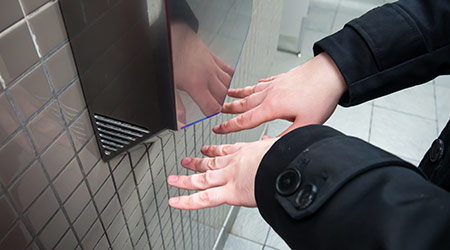
Hand dryers are a niche product for jan/san distributors, delivering only a small fraction of the sales of towels and tissue. It's no surprise, then, that most distributors carry only a few models of hand dryers as a complement to their more popular paper offerings.
Since most distributors only offer a small selection of hand dryers, what attributes are most important? Manufacturers say there are a handful of considerations that rise above all others.
Speed Is Key
Hand dryers have come a long way and manufacturers are working to quash old, negative stereotypes. One of the biggest is the idea they are slow or don't really work. In the past, hand dryers took upward of 1 minute to dry and, even then, typically left hands damp. Many of today's models, however, thoroughly dry hands in 20 seconds and less.
Life in the Digital Age moves at a different pace than when electric hand dryers first debuted. Attention spans are short, and people expect to get in and out of the restroom without delay.
"If people can't dry their hands in under 15 seconds, they are likely to walk away from that hand dryer with wet hands," says Anthony Hall, advanced design engineer for Dyson, Chicago.
For most end users, manufacturers say, speed is the most important feature when choosing a hand dryer. This is particularly true in high-volume facilities, such as airports or sports venues, where speedy turnover trumps all other concerns.
Distributors that want to offer a hand dryer that works fast should pay attention to manufacturers' quoted dry times. Use caution, however, because "it's important to understand whether you are comparing the same metrics," says Hall.
There can be wide variations on exactly how much moisture remains on the hands after a claimed dry time. One way to verify numbers is by asking for third-party testing results. An independent lab can certify things like dry time and energy per use.
Noise A Factor For Hand Dryers

 The Down and Dirty on Cleaning in Virus Season
The Down and Dirty on Cleaning in Virus Season How Surfactant Use is Expanding in Commercial Cleaning
How Surfactant Use is Expanding in Commercial Cleaning Clean Buildings Conference
Clean Buildings Conference
